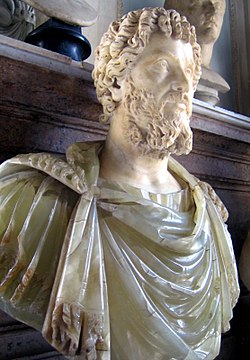Septimius Severus
Roman emperor from 193 to 211 From Wikipedia, the free encyclopedia
Remove ads
Septimius Severus (Lucius Septimius Severus, 11 April 145 AD – 4 February 211) was Roman Emperor from 193 AD to 211. Severus was born in Leptis Magna in the province of Africa. Severus was born an African, and some portraits show him as such. In 187 he married Julia Domna, from Syria.
As a young man, Severus advanced under the reigns of Marcus Aurelius and Commodus. Severus seized power after the death of Emperor Pertinax in 193 during the so-called Year of the Five Emperors. After deposing the incumbent emperor Didius Julianus in a bloodless coup, Severus fought his rival claimants, the generals Pescennius Niger and Clodius Albinus. Niger was defeated in 194 at the Battle of Issus, and Albinus three years later at the Battle of Lugdunum.
After solidifying his rule, Severus waged a brief war against the Parthian Empire, sacking their capital Ctesiphon in 197. In 202 he campaigned in Africa against the Garamantes, briefly taking their capital Garama and expanding the southern frontier of the empire radically.
Late in his reign he fought the Picts in Caledonia and strengthened Hadrian's Wall in Britain. Severus died in 211 at Eboracum, succeeded by his sons Caracalla and Geta. With the succession of his sons, Severus founded the Severan dynasty, the last dynasty of the empire before the Crisis of the Third Century.
Remove ads
Assessment

By the close of his reign the Roman Empire reached an extent of over 5 million square kilometres, which some scholars state expanded the empire to its greatest physical extent.[1][2]
According to Gibbon, "his daring ambition was never diverted from its steady course by the allurements of pleasure, the apprehension of danger, or the feelings of humanity".[3]
He secured Africa, the agricultural base of the Empire where he was born.[4] His victory over the Parthian Empire was for a time decisive.[5] His policy of an expanded and better-rewarded army was criticised by his contemporaries Cassius Dio and Herodianus.[6][7] The large increase in military expenditure caused problems for all of his successors.[2]
Remove ads
References
Wikiwand - on
Seamless Wikipedia browsing. On steroids.
Remove ads

